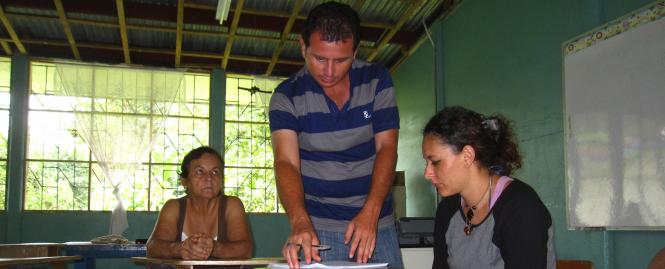Strategic Actor: Diego García Godínez

Juan Diego García Godínez was born in Pérez Zeledón, resettling shortly after in Piedras Blancas with his family. Today, Diego is very active in his community and in the region, serving as president of both the Community Credit Enterprise and the Osa Canton Agricultural Center. He also coordinates the Local Human Development Council in the Piedras Blancas district, which has an emphasis on social work that seeks support for the poorest families in the region.
He is the comptroller for the Regional Federation of Agricultural Centers in the Southern Pacific area, representing this sector in the Advisory Committee of the INA-Brunca Region, working in coordination with the Regional Directorate to find opportunities for trainings and capacity building. Recently, Diego took the position of Secretary for the Management Board of the Territorial Actors Group (GAT).
At the community level, Diego lends his support to the Piedras Blancas Integral Development Association in the procurement of resources towards the second phase construction of a communal, multi-use venue that can serve as an optimal place for playing sports, implement training sessions, and in the case of an emergency, function as a shelter.
Working together with a volunteer from the Peace Corps, he is providing support to a project on wastewater treatment in the Housing Development of Villas del Sur in Piedras Blancas. At the moment, all wastewater flows directly into the Piedras Blancas River that, after less than two kilometers, flows into the Esquinas River and the Piedras Blancas National Park.
For Diego, the most important thing that a community organization can do to be successful is to have members that are well trained, are persevering, and want to be the best organization.
Currently, Diego is developing a project called Finca Integral. During Phase I of INOGO he had the opportunity to visit numerous farming families in the region. There, he realized that small landowners lacked opportunities for developing their lands and that many of them see monoculture of African palm as their only economic option.
For Diego, an alternative to this is the development of diversified integrated farms that are both economically and environmentally sustainable, where sound agricultural practices could be implemented with a small environmental footprint. These farms would also guarantee food-security, generate returns for the families, and in some cases, create opportunities for tourism that benefited rural community development.
Since then, Diego made it a goal to diversify his own land with better varietals of cacao, “mamón chino” (a relative of the lychee), fruit trees, and other crops. His goal is to have the farm be open to other regional producers to serve as a model of alternative farming techniques that others could replicate on their own lands. The location of the farm is easy to access and can be found behind the María Rosa Gámez Solano School in Piedras Blancas, only 100 meters from the Southern Pan-American Highway.
Finca Integral is a medium-term project since it requires training in production techniques, good agricultural practices, the construction of nurseries, and crop rotation.